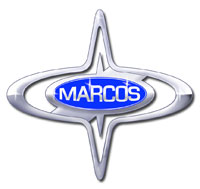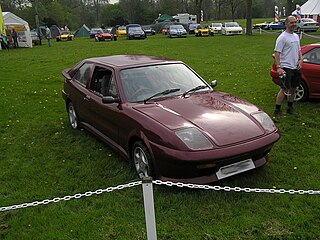
Land Rover is a British brand of predominantly four-wheel drive, off-road capable vehicles, owned by multinational car manufacturer Jaguar Land Rover (JLR), since 2008 a subsidiary of India's Tata Motors. JLR currently builds Land Rovers in Brazil, China, India, Slovakia, and the United Kingdom. The Land Rover name was created in 1948 by the Rover Company for a utilitarian 4WD off-road vehicle; currently, the Land Rover range is comprised solely of upmarket and luxury sport utility vehicles.
Caterham Cars is a British manufacturer of specialist lightweight sports cars established in Caterham, England, with their headquarters in Dartford, England. Their current model, the Caterham 7, originally launched in 1973, is a direct evolution of the Series 3 Lotus Seven designed by Colin Chapman. In the 1990s the company made the Caterham 21, a two-seater soft top alternative to the MGF and Lotus Elise,. A track-only car, the SP/300.R, a joint project with Lola was released for customer testing in 2010 and was scheduled for release in 2013. On 27 April 2011, Team Lotus owner Tony Fernandes announced that he had purchased Caterham. On 2 April 2021, news was leaked that Caterham Cars was acquired outright on 31 March 2021 by VT Holdings, Japanese importer for the Caterham Seven since 2009. As well as being a Caterham importer, VT also imports Lotus cars and Royal Enfield motorcycles into Japan.

The Rover Group plc was the British vehicle manufacturing conglomerate known as "BL plc" until 1986, which had been a state-owned company since 1975. It initially included the Austin Rover Group car business, Land Rover Group, Freight Rover vans and Leyland Trucks. The Rover Group also owned the dormant trademarks from the many companies that had merged into British Leyland and its predecessors such as Triumph, Morris, Wolseley, Riley and Alvis.

Marcos Engineering was a British sports car manufacturer. The name derives from the surnames of founders Jem Marsh and Frank Costin.

The Leyland P76 is a large car that was produced by Leyland Australia, the Australian subsidiary of British Leyland. Featuring what was described at the time as the "standard Australian wheelbase of 111 inches", it was intended to provide the company with a genuine rival to large local models like the Ford Falcon, the Holden Kingswood, and the Chrysler Valiant. But, due to the first real fuel crisis and demand far exceeding the supply, Leyland rushed the assembly process with the first of the P76s to come off the assembly line, resulting in poor build quality and some reliability problems. The combination of the rushed assembly, fuel crisis and strikes at the component manufacturers' factories, resulted in the Leyland P76 being labelled a lemon, despite receiving the Wheels magazine Car of the Year in 1973. By 1974, sales of the P76 had slumped and BMC decided to end the production of the P76. Although the P76 has been labelled a lemon in Australian motoring history, it is viewed by some as an iconic Australian car and has a loyal following.

Touring car and tourer are both terms for open cars. "Touring car" is a style of open car built in the United States which seats four or more people. The style was popular from the early 1900s to the 1930s. The cars used for touring car racing in various series since the 1960s, are unrelated to these early touring cars, despite sharing the same name.

The Land Rover Defender is a series of British off-road cars and pickup trucks. They consistently have four-wheel drive, and were developed in the 1980s from the original Land Rover series which was launched at the Amsterdam Motor Show in April 1948. Following the 1989 introduction of the Land Rover Discovery, the term 'Land Rover' became the name of a broader marque, and thus no longer worked as the name of a specific model; thus in 1990 Land Rover renamed the 90 and 110 as Defender 90 and Defender 110 respectively. The 127 became the Defender 130.

Ginetta Cars Limited is a British specialist builder of racing and sports cars based in Garforth, Leeds, West Yorkshire.

Rochdale cars were a series of mainly glass fibre bodied British sports car made by Rochdale Motor Panels and Engineering in Rochdale, Greater Manchester, England between 1948 and 1973. The company is best remembered for the Olympic coupé made between 1959 and 1973.

The Range Rover is a 4x4, mid-size Off-road vehicle series produced from 1969 to 1996 – initially by the Rover division of British Leyland, and latterly by the Rover Group.
Dutton Cars, based in Worthing, Sussex, England, was a maker of kit cars between 1970 and 1989. In terms of number of kits produced, it was the largest kit-car manufacturer in the world.
Sylva Autokits is a kit car manufacturer based in Lincolnshire, England. Sylva was founded in 1981 by Jeremy Phillips and has developed and produced a number of small and lightweight sports cars. Sylva cars have won a number of 750 Motor Club Kit Car championships.

Quantum Sports Cars was founded by Mark and Harvey Wooldridge in 1987.

The Land Rover series I, II, and III, or simply the Land-Rover are compact British off-road vehicles, produced by the Rover Company since 1948, and later by British Leyland. Though inspired by the World War II jeep, the Land Rover immediately distinguished itself from all other cars. From launch, it was the first mass-produced civilian four-wheel drive car with doors on it, and an available hard roof. Contrary to conventional car and truck chassis, it used a sturdier fully box-welded frame. Furthermore, due to post-war steel shortage, and aluminium surplus, Land Rovers received non-rusting aluminium alloy bodies, favouring their longevity. In 1992, Land Rover claimed that 70% of all the vehicles they had built were still in use.

Eagle Cars Limited was an English company, based in Lancing, West Sussex, originally operated by Allen Breeze, although it has undergone a number of ownership changes since. Originally making a Jeep lookalike called the RV, between 1981 and 1998 they built several iterations of a gull-winged car called the Eagle SS. The SS was based on an American kit car called the Cimbria, and was brought to the UK by Tim Dutton. In 1988 Eagle Cars moved inland, to nearby Storrington.

The Dax Rush is a lightweight two-seater sports car that's offered as a kit. It has a multi-tube triangulated steel space frame chassis, front engine and rear wheel or four wheel drive. The body is constructed in Glass-Reinforced Polymer (GRP) with optional aluminium side panels and bonnet. It complies with the Single Vehicle Approval (SVA) scheme. Two optional rear suspension technologies are offered; De Dion and the IRS. The car is known for its 0–100 km/h performance of close to 3 second runs.

The Mini Hatch, stylised as MINI Hatch, also sold as Mini Cooper, Mini One, or simply called the (BMW) Mini, are a family of retro-styled two-door supermini hatchback and convertible; and a longer, subcompact 4/5-door hatchback. They were introduced in early 2000 by German automaker BMW under the 'Mini' brand. The second generation was launched in 2006 and the third, adding a longer 4/5-door hatchback, in 2014. A two-door convertible version was added in 2004, followed by its second generation in 2008.
Minari Engineering Ltd. was a Limited company based in Staffordshire, UK. They manufactured two vehicles, the Minari Club Sport, and the Minari Road Sport. They specialised in producing the components required to build cars based upon the Alfa Romeo Alfasud and 33 running gear, with bodies mainly constructed from GRP. These could either be purchased in Kit form or through a build agent, Chameleon Cars. Around 130 Mk2 kits were sold before production finally stopped in 2000.

The Siva Motor Car Company was a British manufacturer of automobiles active from 1970 to 1976.
The Ginetta G26 and its derivatives, the 'G28, G30, and G31, are a series of two-door sports cars, designed, developed, and manufactured by British company Ginetta, from 1984 to 1992, primarily in kit form. All models are based on Ford mechanical components. They differ in length as well as in different bodies and engines. All variants together, about 360 vehicles were built in eight years.















